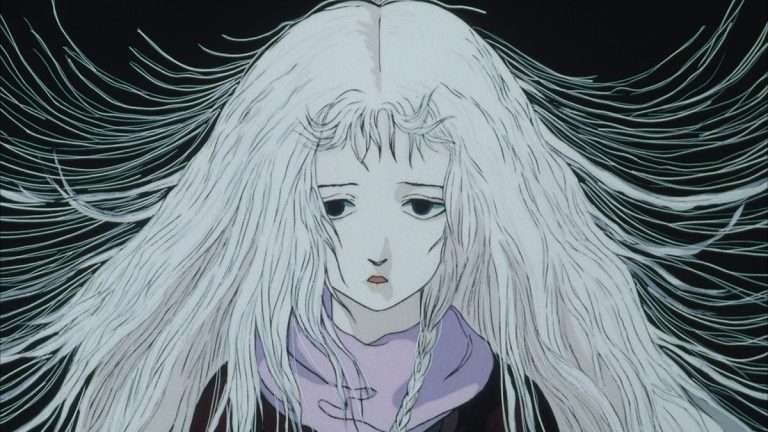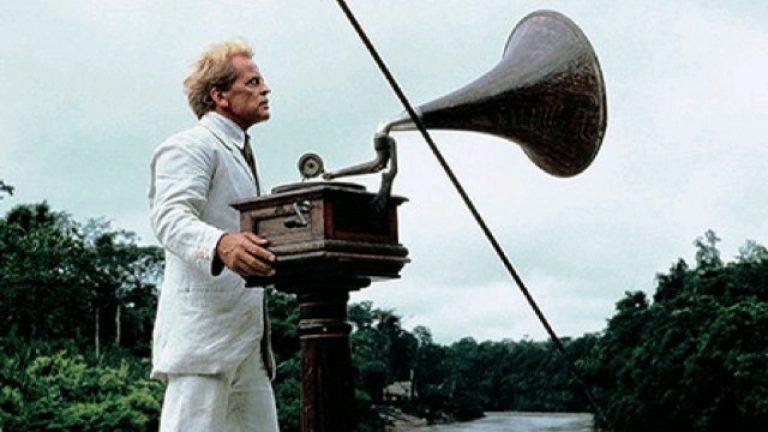When Nelly (Nina Hoss) approaches the Phoenix (2014) bar in search of her lost husband, it seems to be a curious addition to the film’s plot. Even though at that point we are barely 20 minutes into the movie, the direction it is headed in already justifies its name. The importance of this bar, though it is on screen for only a few minutes, raises a question about what exactly the name might signify outside its most obvious reference. With its focus on a search for one’s self in a world that fails to cooperate with that search, the eponymous bird is possibly the most easily recognizable symbol. It also clearly takes a lot of inspiration from Hitchcock’s Vertigo through the idea of how individuals can seek their identity through others. It is this play of the idea of identity that lends the movie’s name a most curious ambiguity.
Nelly, the protagonist, is an Auschwitz survivor who undergoes a facial reconstruction surgery after getting unrecognizably mutilated through possible torture or violation. Even though the doctor recommends that she go for a new face as that means she becomes ‘a new and different person’, she is insistent on having her old face back. The surgery, though, fails to bring her old face entirely back, leaving her with a psychological chasm which can be seen after she sees her new face in a broken mirror. In her pursuit of finding her old life back in post-World War II Berlin, she decides to track down her husband, Johannes (Ronald Zehrfeld). Her friend, Lene (Nina Kunzendorf), made the surgery possible and is her closest companion though is completely against this exercise as his loyalty is suspect.
Related Read to Phoenix (2014): Phoenix (2015): Mired Love
A bureaucratic record makes Lene believe that he betrayed Nelly to the Nazis, an act that Nelly cannot begin to imagine and therefore, outright denies. When she goes to search for Johannes, she finds the former pianist working as a busboy at the Phoenix bar. He does not recognize her at first but soon decides to use her as the key in a plan to usurp Nelly’s inheritance, all the while only seeing Nelly as a dead ringer for his own dead wife, not herself in the least! Soon, Nelly (calling herself Esther in front of Johannes) relents to the idea and he gets busy with turning her into his old wife – imbibing in her manners, gait, handwriting, signature and even reactions similar to his wife’s.
One can clearly see Phoenix’s similarity with Hitchcock’s Vertigo. The idea of undermining one’s self in a submission to their beloved’s idea of who they might be, and the rigorous act of recreating themselves through each other lay at the heart of that film. Much like Scotty’s desire to turn Judy into Madeleine, who really is Madeleine, Johannes’s desire to turn Esther into Nelly is a severely masochistic act for the woman who is submitting herself to this perverse interplay of identities. Despite the force of their desire, both women see better reason in giving into this game than reveal themselves as the subsequent explanation would be too puzzling, and the revelation itself too bewildering. But Nelly’s concern is very different from Madeleine, in that her submission is borne out of a complex web of desires whereas the latter’s was out of a simple sense of guilt. And the game is just as darkly abnormal as it was in Vertigo though thankfully, Zehrfeld is a much better actor than Jimmy Stewart.
Related Read to Phoenix (2014): Hitchcock and His Emotional Minefield
It is these acts, which are rehearsed throughout the film that uphold a most peculiar dimension in the film’s conception of identity. When they meet, much to Nelly’s dismay, Nelly and Johannes are essentially strangers. He does not doubt for a second that Esther might be Nelly, and that certitude is also a clue of his past disloyalty as he certainly believes that she could not have survived his deception. But the peculiarity is in how it is only after he makes her act like Nelly that he starts to see how similar she is to her, especially when he notices her handwriting yet still does not notice the obvious. The reason behind this charade is to ensure that their friends and family members recognize her as the real Nelly and yet Johannes, her own husband, fails to do so.
While Nelly engages in this game, we slowly come to realize her love for Johannes. Her tragedy is that on the one hand, she is clearly trying to return to her old life while on the other, she is facilitating a complete erasure of it by letting Johannes continue with his plans. The perversity here arises out of the queer notion of the entire act. Hoss’s magnificent performance clarifies at every step how much she is in love with him and the extent to which she is willing to go in order to remain close to him. It might just be that the effacement her past faces in Johannes’s hand is seen by her as being the key to rebuilding herself. As someone who is so staunchly attached to her past, letting Johannes erase it completely is another hint at her love for him.
Similar Read to Phoenix (2014): Why The Oscars Need To Start Recognizing Horror Films
While Nelly is clearly enamored of him, Johannes seems to remain unfazed, with little to no emotional attachment displayed towards Nelly. He sees her entirely as a means to an end. In not recognizing Nelly, it is the words of the doctor that seem to ring true, that no matter how well a face is reconstructed, it can never look as good as it did originally. And in tying her old identity entirely to her face, so does her past get unalterably attached to it. Every time Nelly tries to kiss or hug Johannes, his rebukes complicate our understanding of him as it does for her, who probably interprets it as a sign of his fidelity – if he does not take up a new lover even as a widower, is he even capable of a deviation as severe as betraying his own wife?
It is here that the name of the movie becomes interesting. The phoenix is the most resilient of creatures in Western mythology and has always served that exact emblematic purpose, that of signifying new beginnings. For Nelly, the answer is rather simple as she is basically trying to reset her life to the way it was before the march of history brought it to an end. The Phoenix bar, where the inciting act takes place can also be seen as being a reference. With its music, dance and celebratory atmosphere, it’s the only space in the film which seems to rejoice in the end of the war and actually look towards the future. It is also among the handful of locations that does not look demolished, again signifying its dissociation from the past. And it is from Nelly and Johannes’s meeting here that their pursuit for their own identities through each other begins. Johannes, with his search for a better future but with a complete detachment from his past can also be this phoenix.
Also, Read: 10 Best Joaquin Phoenix Movie Performances
Petzold set this film in Berlin right after the Second World War, at a time of a nation rebuilding itself from its literal ruins and building for itself, an identity that would both sever it from its immediate past’s violent horror while also ensuring its acknowledgment in order to not let a similar tide come into being again. Unlike Rosselini, he does not show this decimated city in a pitiful fashion but instead uses vibrant colors as an indication of a move towards a better tomorrow. Perhaps it is here that the film’s name becomes clear. It can be about Nelly and Johannes and even Lene, but beyond it all, it is about a people’s endeavor to rise from their culture’s ashes and the three of them are only variations of how they go about it.
It can be through a most doomed pursuit of trying to go back to how things exactly were, like Nelly. It can be through a questionable yet pragmatic desire to survive like Johannes. Or it can be through running away from the atmosphere that surrounds one, to a promised land in search of a completely new identity by having pride in what was inhumanly denigrated in the past that one is trying to escape, like Lene. Regardless of which path is given greater precedence, Nelly’s submission like Madeleine’s and Johannes’s obsession like Scotty’s are exponents of the sheer desperation of Germans at that critical juncture in their history. By being strangers to each other despite having shared a significant past, they raise a question that faces us in a most glaring fashion throughout the film – how can one rebuild their identity if they cannot even recognize who they truly were once?







